JVC KS-FX473R, KS-FX470R, KS-F360R, KS-F363R User Manual
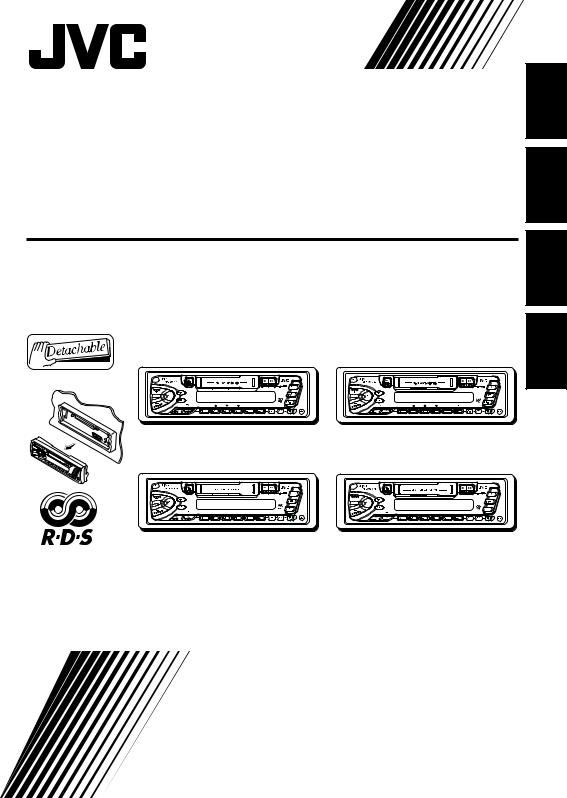
CASSETTE RECEIVER
CASSETTEN-RECEIVER
RADIOCASSETTE
RADIO/CASSETTESPELER
KS-FX473R/KS-FX470R
KS-F363R/KS-F360R
KS-FX473R |
KS-FX470R |
KS-FX473R |
KS-FX470R |
KS-F363R |
KS-F360R |
KS-F363R |
KS-F360R |
NEDERLANDS FRANÇAIS DEUTSCH ENGLISH
For installation and connections, refer to the separate manual.
Für den Einbau und die Anschlüsse siehe das eigenständige Handbuch. Pour l’installation et les raccordements, se référer au manuel séparé.
Bijzonderheden over de installatie en aansluiting van het apparaat vindt u in de desbetreffende handleiding.
INSTRUCTIONS
BEDIENUNGSANLEITUNG
MANUEL D’INSTRUCTIONS
GEBRUIKSAANWIJZING
GET0054-001A [E/EX]

ENGLISH
Thank you for purchasing a JVC product. Please read all instructions carefully before operation, to ensure your complete understanding and to obtain the best possible performance from the unit.
CONTENTS
LOCATION OF THE BUTTONS ............ |
3 |
SOUND ADJUSTMENTS .................. |
16 |
|
Control panel — |
|
Selecting preset sound modes ................. |
16 |
|
KS-FX473R/KS-FX470R ....................... |
3 |
Adjusting the sound ................................. |
16 |
|
Control panel — |
|
Storing your own sound adjustments ....... |
17 |
|
KS-F363R/KS-F360R ............................ |
4 |
OTHER MAIN FUNCTIONS |
18 |
|
BASIC OPERATIONS |
5 |
|||
Setting the clock ...................................... |
18 |
|||
Turning on the power ................................ |
5 |
Changing the general settings (PSM) ...... |
19 |
|
RADIO BASIC OPERATIONS |
6 |
Detaching the control panel ...................... |
21 |
|
CD CHANGER OPERATIONS |
|
|||
Listening to the radio ................................ |
6 |
|
||
Storing stations in memory ....................... |
7 |
(only for KS-FX473R/KS-FX470R) ...... |
22 |
|
Tuning into a preset station ...................... |
8 |
Playing CDs ............................................. |
22 |
|
RDS OPERATIONS |
9 |
Playing at random (Random Play) ............ |
23 |
|
MAINTENANCE |
24 |
|||
What you can do with RDS ....................... |
9 |
|||
Other convenient RDS functions and |
|
TROUBLESHOOTING |
25 |
|
adjustments ........................................... |
13 |
|||
TAPE OPERATIONS ....................... |
15 |
SPECIFICATIONS .......................... |
27 |
|
Listening to a cassette .............................. |
15 |
|
|
Note:
For security reasons, a numbered ID card is provided with this unit, and the same ID number is imprinted on the unit’s chassis. Keep the card in a safe place, as it will help the authorities to identify your unit if stolen.
BEFORE USE
*For safety....
•Do not raise the volume level too much, as this will block outside sounds, making driving dangerous.
•Stop the car before performing any complicated operations.
*Temperature inside the car....
If you have parked the car for a long time in hot or cold weather, wait until the temperature in the car becomes normal before operating the unit.
2
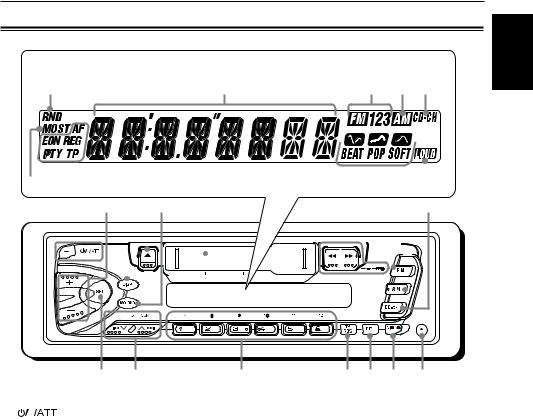
LOCATION OF THE BUTTONS 
Control panel — KS-FX473R/KS-FX470R
Display window
i |
o |
; a s |
ENGLISH
|
|
|
|
|
|
|
|
|
|
|
|
|
|
|
|
|
|
|
|
|
|
|
|
|
|
|
|
|
|
|
|
|
|
|
|
|
|
|
|
|
|
|
|
|
|
|
|
|
|
|
|
|
|
|
|
|
|
|
|
|
|
|
|
|
|
|
|
|
|
|
|
|
|
|
|
|
|
|
|
|
|
|
|
|
|
||
d f |
|
|
|
|
|
|
|
|
|
|
|
|
|
|
|
|
|
|
|
|
|
|
|
|
|
|
|
|
|
|
|
g |
|
|
|
|
|
h |
|||||
1 |
2 3 45 |
6 |
|
|
|
|
|
7 |
|
|
|
|
|
|
|
8 9 p |
|||||||||||||||||||||||||||
|
|
|
|
|
|
|
|
|
|
|
|
|
|
|
|
|
|
|
|
|
|
|
|
|
|
|
|
|
|
|
|
|
|
|
|
|
|
|
|
|
|
|
|
|
|
|
|
|
|
|
|
|
|
|
|
|
|
|
|
|
|
|
|
|
|
|
|
|
|
|
|
|
|
|
|
|
|
|
|
|
|
|
|
|
|
|
|
|
|
|
|
|
|
|
|
|
|
|
|
|
|
|
|
|
|
|
|
|
|
|
|
|
|
|
|
|
|
|
|
|
|
|
|
|
|
|
|
|
|
|
|
|
|
|
|
|
|
|
|
|
|
|
|
|
|
|
|
|
|
|
|
|
|
|
|
|
|
|
|
|
|
|
|
|
|
|
|
|
|
|
|
|
|
|
|
q |
w |
e |
r t y |
u |
|
|
|
|
|
1 |
|
(standby/on/attenuator) button |
|
||
|
||
2 |
+/– buttons |
|
3 |
DISP (display) button |
|
4 |
0(eject) button |
|
5 |
MO/RND (monaural/random) button |
|
6 |
Cassette compartment |
|
7 |
1/¡(PROG:program) buttons |
|
8 |
FM button |
|
9 |
AM button |
|
p CD-CH (CD changer) button q SEL (select) button
w4 /
/ ¢buttons
¢buttons
• Also function as SSM buttons when pressed
together.
e Number buttons
r TP (traffic programme) button RDS (radio data system) button
t PTY (programme type) button y SOUND button
u  (control panel release) button
(control panel release) button
Display window
i RND (random) indicator o Main display
;FM band number indicators FM1, FM2, FM3
a AM indicator
s CD-CH (CD changer) indicator
dMO (monaural) indicator
ST (stereo) indicator
fRDS indicators
AF, EON, REG, PTY, TP
g Sound mode indicators BEAT, POP, SOFT
h LOUD indicator
3
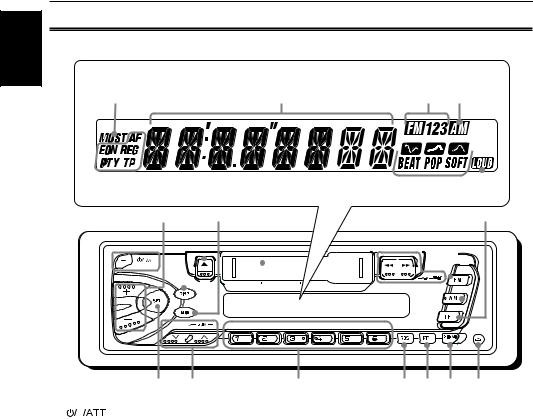
ENGLISH
 LOCATION OF THE BUTTONS
LOCATION OF THE BUTTONS
Control panel — KS-F363R/KS-F360R
Display window
i |
o |
; a |
|
|
|
|
|
|
|
|
|
|
|
|
|
|
|
|
|
|
|
|
|
|
|
|
|
|
|
|
|
|
|
|
|
|
|
|
|
|
|
|
|
|
|
|
|
|
|
|
|
|
|
|
|
|
|
|
|
|
|
|
|
|
|
|
|
|
|
|
|
|
|
|
|
|
|
|
|
|
|
|
|
|
|
|
|
|
|
|
|
|
||
s |
|
|
|
|
|
|
|
|
|
|
|
|
|
|
|
|
|
|
|
|
|
|
|
|
|
|
|
|
|
|
|
|
|
d |
|
|
|
|
|
f |
|||||
1 |
2 3 45 |
6 |
|
|
|
|
|
7 |
|
|
|
|
|
|
|
|
8 9 p |
||||||||||||||||||||||||||||
|
|
|
|
|
|
|
|
|
|
|
|
|
|
|
|
|
|
|
|
|
|
|
|
|
|
|
|
|
|
|
|
|
|
|
|
|
|
|
|
|
|
|
|
|
|
|
|
|
|
|
|
|
|
|
|
|
|
|
|
|
|
|
|
|
|
|
|
|
|
|
|
|
|
|
|
|
|
|
|
|
|
|
|
|
|
|
|
|
|
|
|
|
|
|
|
|
|
|
|
|
|
|
|
|
|
|
|
|
|
|
|
|
|
|
|
|
|
|
|
|
|
|
|
|
|
|
|
|
|
|
|
|
|
|
|
|
|
|
|
|
|
|
|
|
|
|
|
|
|
|
|
|
|
|
|
|
|
|
|
|
|
|
|
|
|
|
|
|
|
|
|
|
|
|
|
|
|
|
|
|
|
|
|
q |
w |
e |
r t y u |
1 |
|
(standby/on/attenuator) button |
|
||
|
||
2 |
+/– buttons |
|
3 |
DISP (display) button |
|
4 |
0(eject) button |
|
5 |
MO (monaural) button |
|
6 |
Cassette compartment |
|
7 |
1/¡(PROG:program) buttons |
|
8 |
FM button |
|
9 |
AM button |
|
p TP (traffic programme) button q SEL (select) button
w /
/ buttons
buttons
•Also function as SSM buttons when pressed together.
e Number buttons
r RDS (radio data system) button t PTY (programme type) button y SOUND button
u  (control panel release) button
(control panel release) button
Display window
iMO (monaural) indicator
ST (stereo) indicator
o Main Display
;FM band number indicators
FM1, FM2, FM3
a AM indicator
sRDS indicators
AF, EON, REG, PTY, TP
d Sound mode indicators
BEAT, POP, SOFT f LOUD indicator
4
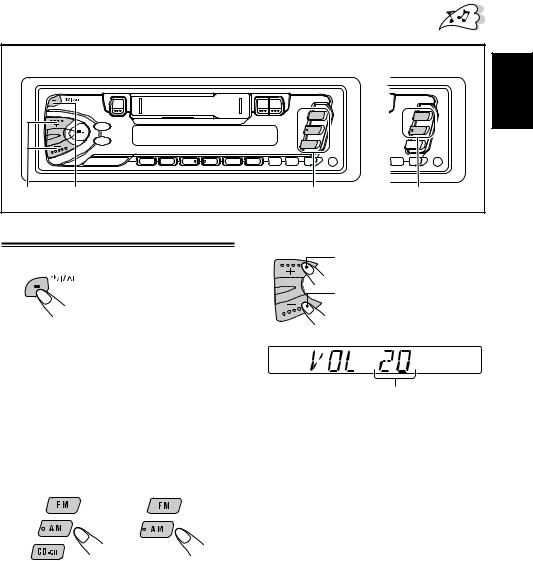
|
|
BASIC OPERATIONS |
ENGLISH |
|
KS-FX473R/KS-FX470R |
|
KS-F363R/KS-F360R |
||
|
|
|||
3 |
1 |
2 |
2 |
|
Turning on the power |
3 Adjust the volume. |
|
||
1 Turn on the power. |
|
To increase the volume. |
|
|
|
|
|
||
|
|
|
To decrease the volume. |
|
Notes on One-Touch Operation:
•When you select a source in step 2 below, the power automatically comes on. You do not have to press this button to turn on the power.
•If the cassette is already in the cassette compartment, tape play starts automatically. However, it is not recommended to leave the cassette in the compartment when turning off the power or ignition key. It may damage the tape head and the cassette.
2 Select the source.
Volume level appears.
4 Adjust the sound as you want. (See pages 16 – 17.)
To drop the volume in a moment
KS-FX473R KS-F363R
KS-FX470R KS-F360R
To operate the tuner (FM or AM), see pages 6 – 14.
To operate the tape, see page 15.
To operate the CD changer
(Only for KS-FX473R/KS-FX470R), see pages 22 – 23.
Press 


 briefly while listening to any source. “ATT” starts flashing on the display, and the volume level will drop in a moment.
briefly while listening to any source. “ATT” starts flashing on the display, and the volume level will drop in a moment.
To resume the previous volume level, press the button briefly again.
To turn off the power
Press and hold 


 until “SEE YOU” appears on the display.
until “SEE YOU” appears on the display.
Note:
When you use this unit for the first time, set the built-in clock correctly, see page 18.
5
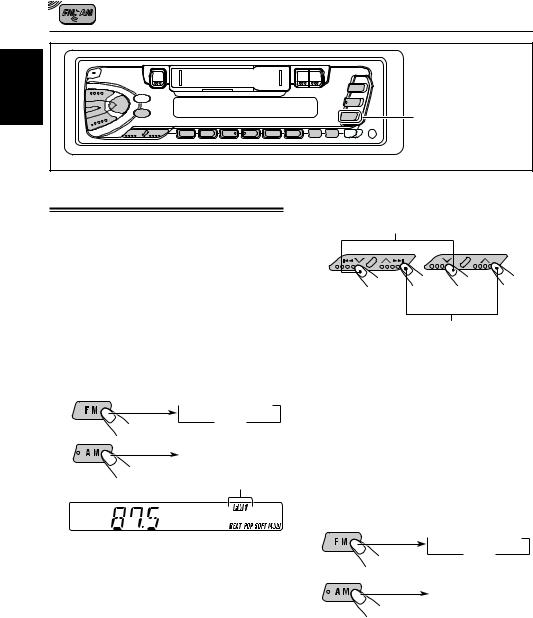
RADIO BASIC OPERATIONS
ENGLISH
Only for KS-F363R/
KS-F360R
Listening to the radio |
2 Start searching a station. |
You can use either automatic searching or manual searching to tune into a particular station.
Note:
When a cassette is in the cassette compartment, you cannot select the tuner. Be sure to eject the cassette from the cassette compartment to listen to the radio.
Searching a station automatically: Auto search
To search stations of lower frequencies.
KS-FX473R KS-F363R
KS-FX470R KS-F360R
To search stations of higher frequencies.
When a station is received, searching stops.
1 Select the band (FM1 – 3, AM).
 FM1
FM1  FM2
FM2
FM3 
AM
Selected band appears.
Note:
This receiver has three FM bands (FM1, FM2,
FM3). You can use any one of them to listen to an FM broadcast.
To stop searching before a station is received, press the same button you have pressed for searching.
Searching a station manually: Manual search
1 Select the band (FM1 – 3, AM).
 FM1
FM1  FM2
FM2
FM3 
AM
Note:
This receiver has three FM bands (FM1, FM2, FM3). You can use any one of them to listen to an FM broadcast.
6
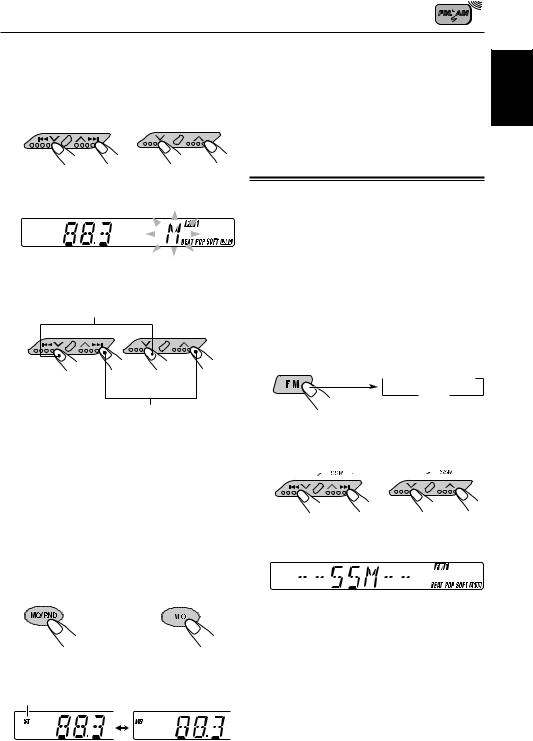
2 Press and hold 4  /
/ ¢(for
¢(for
KS-FX473R/KS-FX470R) or  /
/ (for KS-F363R/KS-F360R) until “M (manual)” starts flashing on the display.
(for KS-F363R/KS-F360R) until “M (manual)” starts flashing on the display.
When the MO indicator is lit on the display, the sound you hear becomes monaural but the reception will be improved (the ST indicator goes off).
To restore the stereo effect, press the same button again.
ENGLISH
KS-FX473R KS-F363R
KS-FX470R KS-F360R
3 Tune into a station you want while “M”
is flashing.
To tune into stations of lower frequencies.
KS-FX473R KS-F363R
KS-FX470R KS-F360R
To tune into stations of higher frequencies.
•If you hold down the button, the frequency keeps changing (in 50 kHz intervals for FM and 9 kHz intervals for AM – MW/LW) until you release the button.
Storing stations in memory
You can use one of the following two methods to store broadcasting stations in memory.
•Automatic preset of FM stations: SSM (Strongstation Sequential Memory)
•Manual preset of both FM and AM stations
FM station automatic preset: SSM
You can preset 6 local FM stations in each FM band (FM1, FM2, and FM3).
1 Select the FM band (FM1 – 3) you want to store FM stations into.
 FM1
FM1  FM2
FM2
FM3 
2 Press and hold both buttons for more than 2 seconds.
When an FM stereo broadcast is hard to receive:
Press MO/RND (for KS-FX473R/KS-FX470R) or
MO (for KS-F363R/KS-F360R) while listening to an FM stereo broadcast.
•Each time you press the button, the MO indicator lights up and goes off alternately.
KS-FX473R |
KS-F363R |
KS-FX470R |
KS-F360R |
Lights up when receiving an FM broadcast in stereo.
KS-FX473R |
KS-F363R |
KS-FX470R |
KS-F360R |
“SSM” appears, then disappears when automatic preset is over.
Local FM stations with the strongest signals are searched and stored automatically in the band number you have selected (FM1, FM2 or FM3).
These stations are preset in the number buttons — No.1 (lowest frequency) to No.6 (highest frequency).
When automatic preset is over, the station stored in number button 1 will be automatically tuned into.
7
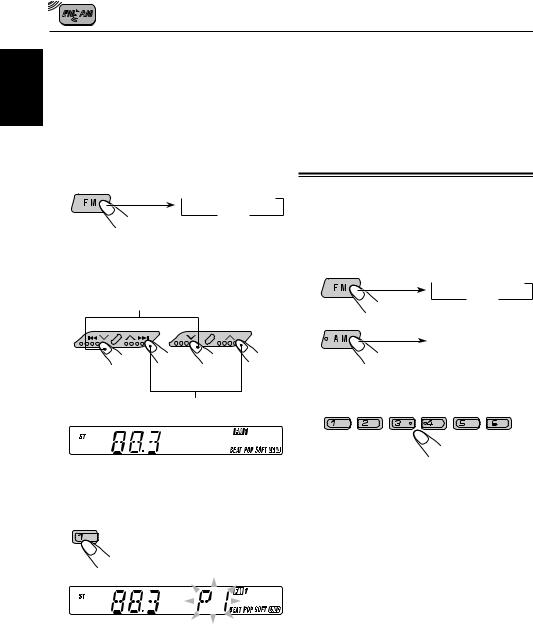
ENGLISH
Manual preset
You can preset up to 6 stations in each band (FM1,
FM2, FM3 and AM) manually.
Ex.: Storing an FM station of 88.3 MHz into the preset number 1 of the FM1 band
1 Select the band (FM1 – 3, AM) you want to store stations into (in this example, FM1).
 FM1
FM1  FM2
FM2
FM3 
2 Tune into a station (in this example,
of 88.3 MHz).
To tune into stations of lower frequencies.
KS-FX473R KS-F363R
KS-FX470R KS-F360R
To tune into stations of higher frequencies.
3 Press and hold the number button (in this example, 1) for more than 2 seconds.
Notes:
•A previously preset station is erased when a new station is stored in the same preset number.
•Preset stations are erased when the power supply to the memory circuit is interrupted (for example, during battery replacement). If this occurs, preset the stations again.
Tuning into a preset station
You can easily tune into a preset station. Remember that you must store stations first. If you have not stored them yet, see “Storing stations in memory” on page 7.
1 Select the band (FM1 – 3, AM).
 FM1
FM1  FM2
FM2
FM3 
AM
2 Select the number (1 – 6) for the preset station you want.
“P1” flashes for a few seconds.
4 Repeat the above procedure to store other stations into other preset numbers.
8
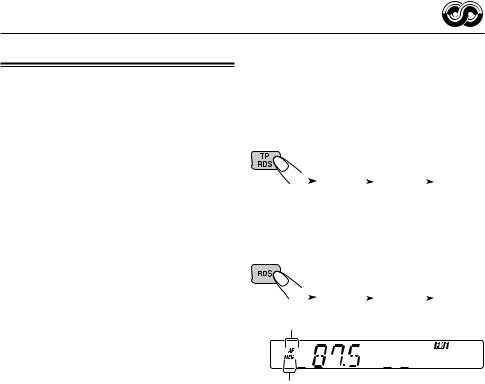
RDS OPERATIONS
What you can do with RDS
RDS (Radio Data System) allows FM stations to send an additional signal along with their regular programme signals. For example, the stations send their station names, as well as information about what type of programme they broadcast, such as sports or music, etc.
Another advantage of RDS function is called “Enhanced Other Networks.” The EON indicator lights up while receiving an FM station with the Enhanced Other Networks data. By using these data sent from a station, you can tune into a different station of a different network broadcasting your favorite programme or traffic announcement while listening to another programme or to another source such as tape.
By receiving the RDS data, this unit can do the following:
•Tracing the same programme automatically (Network-Tracking Reception)
•Standby Reception of TA (Traffic
Announcement) or your favorite programme
•PTY (Programme Type) search
•And some other functions
Tracing the same programme automatically (Network-Tracking Reception)
When driving in an area where FM reception is not good, the tuner built in this unit automatically tunes into another RDS station, broadcasting the same programme with stronger signals. So, you can continue to listen to the same programme in its finest reception, no matter where you drive. (See the illustration on the next page.)
Two types of the RDS data are used to make
Network-Tracking Reception work correctly — PI
(Programme Identification) and AF (Alternative Frequency).
Without receiving these data correctly from the RDS station you are listening to, Network-Tracking
Reception will not operate.
Using Network-Tracking Reception |
|
|
|
|
|
||||||||||||
|
|
|
|
ENGLISH |
|||||||||||||
Each time you press and hold the button, |
|||||||||||||||||
For KS-FX473R/KS-FX470R: |
|
|
|
|
|
||||||||||||
Press and hold TP RDS (Traffic Programme/ |
|
||||||||||||||||
Radio Data System) for more than 1 second. |
|
||||||||||||||||
Network-Tracking Reception modes change as |
|
||||||||||||||||
|
|||||||||||||||||
follows: |
|
|
|
|
|
|
|
|
|
|
|||||||
|
|
|
Mode 1 |
|
|
|
|
Mode 2 |
|
|
|
|
Mode 3 |
|
|
|
|
|
|
|
|
|
|
|
|
|
|
|
|
|
|
|
|
||
For KS-F363R/KS-F360R: |
|
|
|
|
|
|
|
|
|
|
|||||||
Press RDS (Radio Data System). |
|
|
|
|
|
||||||||||||
Each time you press the button, Network- |
|
||||||||||||||||
Tracking Reception change as follows: |
|
|
|
|
|
||||||||||||
|
|
|
Mode 1 |
|
|
Mode 2 |
|
|
Mode 3 |
|
|
|
|||||
|
|
|
|
|
|
|
|
|
|
|
|
|
|||||
AF indicator |
|
|
|
|
|
|
|
|
|
|
|||||||
REG indicator
Mode 1
The AF indicator lights up but the REG indicator does not.
Network-Tracking Reception is activated with
Regionalization set to “off.”
Switches to another station within the same network when the receiving signals from the current station become weak.
•In this mode, the programme may differ from the one currently received.
Mode 2
Both the AF indicator and the REG indicator light up.
Network-Tracking Reception is activated with
Regionalization set to “on.”
Switches to another station, within the same network, broadcasting the same programme when the receiving signals from the current station become weak.
Mode 3
Neither the AF indicator nor the REG indicator lights up.
Network-Tracking Reception is deactivated.
9
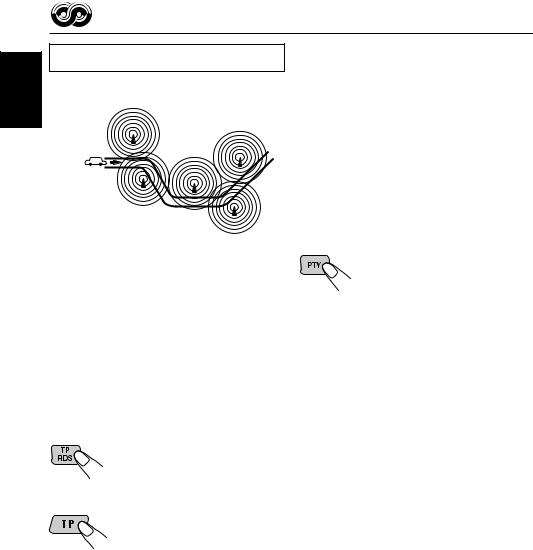
The same programme can be received on
ENGLISH |
different frequencies. |
|
|
|
|
|
Programme 1 |
|
|
broadcasting |
Programme 1 |
|
on frequency A |
|
|
broadcasting |
|
|
|
|
|
|
on frequency E |
Programme 1 |
|
|
broadcasting |
|
|
on frequency B |
Programme 1 |
|
|
broadcasting |
Programme 1 |
|
on frequency C |
|
|
|
broadcasting |
|
|
on frequency D |
Using Standby Reception
Standby Reception allows the unit to switch temporarily to your favorite programme (PTY:
Programme Type) and Traffic Announcement (TA) from the current source (another FM station, tape, or CD changer (only for KS-FX473R/KS-FX470R).
•Standby Reception will not work if you are listening to an AM station.
TA Standby Reception
KS-FX473R
KS-FX470R
KS-F363R
KS-F360R
When you press TP RDS (for KS- FX473R/KS-FX470R) or TP (for
KS-F363R/KS-F360R) while listening to an FM station, the TP indicator is lit during reception of a TP (Traffic Programme) station and the TA standby mode is engaged.
•When the station being received is not a TP station,
the TP indicator flashes. Press 4 /
/ ¢ (for
¢ (for
KS-FX473R/KS-FX470R) or  /
/ (for KS-F363R/
(for KS-F363R/
KS-F360R) to engage the TA standby mode. “SEARCH” appears on the display, and TP station search starts. When a TP station is tuned into, the TP indicator is lit.
7If you are listening to a cassette (or CD changer: only for KS-FX473R/KS-FX470R) and wish to listen to a TP station, eject the cassette and press TP RDS or TP to enter the TA standby mode. (The TP indicator lights up.)
If a traffic programme starts broadcasting while the TA standby mode is active, “TRAFFIC” appears and the playback source changes to the FM band. The volume increases to the preset TA volume level (see page 13) and the traffic programme can be heard.
To deactivate the TA standby mode, press TP RDS or TP.
PTY Standby Reception
When you press PTY while listening to an FM station, the PTY indicator is lit during reception of a PTY station and the PTY standby mode is engaged.The selected PTY name stored on page 11 flashes for 5 seconds.
• When the station being received is not a PTY station, the PTY indicator flashes. Press 4  /
/ ¢ (for KS-FX473R/KS-FX470R) or
¢ (for KS-FX473R/KS-FX470R) or  /
/ (for KS-
(for KS-
F363R/KS-F360R) to engage the PTY standby mode.
“SEARCH” appears on the display, and PTY station search starts. When a PTY station is tuned into, the
PTY indicator is lit.
7If you are listening to a cassette (or CD changer: only for KS-FX473R/KS-FX470R) and wish to listen to a selected PTY broadcast, eject the cassette and press PTY to enter the
PTY standby mode. (The PTY indicator lights up.)
If the selected PTY programme starts broadcasting while the PTY standby mode is active, the selected PTY name appears and the playback source changes to the FM band. The selected PTY programme can then be heard.
To deactivate the PTY standby mode, press PTY again.
10
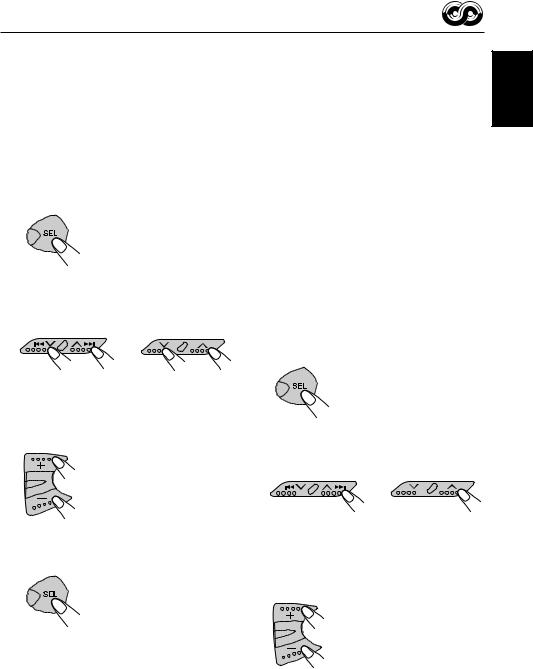
Selecting your favorite programme for PTY Standby Reception
You can select your favorite programme for PTY Standby Reception to store in memory.
When shipped from the factory, “NEWS” is stored as the programme type for PTY Standby Reception.
1 Press and hold SEL (select) for more than 2 seconds so that one of the PSM items appears on the display. (PSM: see page 20.)
Searching your favorite programme
You can search one of your 6 favorite programme types stored in memory.
When shipped from the factory, the following 6 programme types have been stored in the number buttons (1 to 6).
To store your favorite programme types, see below.
To search your favorite programme type, see page 12.
1 |
2 |
3 |
POP M |
ROCK M |
EASY M |
|
|
|
4 |
5 |
6 |
CLASSICS |
AFFAIRS |
VARIED |
2 Select “PTY STBY (standby)” if not shown on the display.
To store your favorite programme types
1 Press and hold SEL (select) for more than 2 seconds so that one of the PSM items appears on the display. (PSM: see page 20.)
KS-FX473R |
KS-F363R |
KS-FX470R |
KS-F360R |
3 Select one of twenty-nine PTY codes. (See page 14.)
Selected code name
appears on the display and is stored into memory.
4 Press SEL (select) to finish the setting.
2 Select “PTY SRCH (search)” if not shown on the display.
KS-FX473R KS-F363R
KS-FX470R KS-F360R
3 Select one of twenty-nine PTY codes. (See page 14.)
Selected code name appears on the display.
•If the code already stored in memory is selected, it
will flash on the display.
CONTINUED ON THE NEXT PAGE
ENGLISH
11
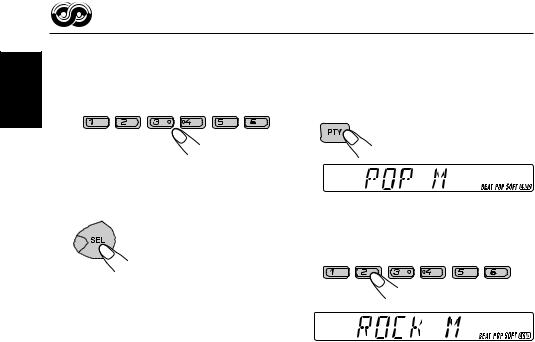
ENGLISH
4 Press and hold the number button for more than 2 seconds to store the PTY code selected into the preset number you want.
To search your favorite programme type
1 Press and hold PTY (programme type) for more than 1 second while listening to an FM station.
|
The selected code name will flash on the |
|
|
display. |
|
5 |
Press SEL (select) to finish the setting. |
The last selected PTY code appears. |
|
2 Select one of the PTY codes stored in the preset number buttons (1 to 6).
Ex.: When “ROCK M” is stored in preset number button 2
PTY search for your favorite programme starts after 5 seconds.
• If there is a station broadcasting a programme of the same PTY code you selected, that station is tuned into.
• If there is no station broadcasting a programme of the same PTY code you selected, the station will not change.
Note:
In some areas, the PTY search will not work correctly.
12

Other convenient RDS functions and adjustments
Changing the display mode while listening to an FM station
You can change the initial indication on the display to station name (PS NAME), station frequency (FREQ) or clock time (CLOCK), while listening to an FM RDS station.
•See also “Changing the general settings
(PSM)” on page 19.
1 Press and hold SEL (select) for more than 2 seconds so that one of the PSM items appears on the display.
2 Press 4  /
/ ¢(for KS-FX473R/KS-
¢(for KS-FX473R/KS-
FX470R) or  /
/ (for KS-F363R/KS-F360R) to select “DISPMODE” (display mode).
(for KS-F363R/KS-F360R) to select “DISPMODE” (display mode).
3 Press + or – to set to the desired indication
(“PS NAME,” “FREQ” or “CLOCK”).
4 Press SEL (select) to finish the setting.
Note:
By pressing DISP, you can also change the display while listening to an FM RDS station.
Each time you press the button, the following information appears on the display:
Station name (PS NAME)
Station frequency (FREQ)
Programme type (PTY)
Clock time (CLOCK)
•Then, the display goes back to the original indication in several seconds.
Setting the TA volume level
You can preset the volume level for TA Standby
Reception. When a traffic programme is received, the volume level automatically changes to the preset level.
•See also “Changing the general settings
(PSM)” on page 19.
1 Press and hold SEL (select) for more than 2 seconds so that one of the PSM items appears on the display.
2 Press 4  /
/ ¢(for KS-FX473R/KS-
¢(for KS-FX473R/KS-
FX470R) or  /
/ (for KS-F363R/KS-F360R) to select “TA VOL.”
(for KS-F363R/KS-F360R) to select “TA VOL.”
3 Press + or – to set to the desired volume.
You can set it from “VOL 00” to “VOL 50.”
4 Press SEL (select) to finish the setting.
Automatic clock adjustment
When shipped from the factory, the clock built in this unit is set to be readjusted automatically using the CT (Clock Time) data in the RDS signal.
If you do not want to use automatic clock adjustment, follow the procedure below.
•See also “Changing the general settings
(PSM)” on page 19.
1 Press and hold SEL (select) for more than 2 seconds so that one of the PSM items appears on the display.
2 Press 4  /
/ ¢(for KS-FX473R/KS- FX470R) or
¢(for KS-FX473R/KS- FX470R) or  /
/ (for KS-F363R/KS-F360R) to select “AUTO ADJ (adjustment).”
(for KS-F363R/KS-F360R) to select “AUTO ADJ (adjustment).”
3 Press – to select “ADJ OFF.”
Now automatic clock adjustment is canceled.
4 Press SEL (select) to finish the setting.
To reactivate clock adjustment, repeat the same procedure and select “ADJ ON” in step 3 by pressing +.
Note:
It takes about 2 minutes to adjust the time using the CT data. So, you should not change the station for more than 2 minutes continuously; otherwise, the clock time will not be adjusted.
ENGLISH
13

ENGLISH
PTY codes
NEWS: |
News |
SOCIAL: |
Programmes on social activities |
AFFAIRS: |
Topical programmes expanding |
RELIGION: |
Programmes dealing with any |
|
on current news or affairs |
|
aspect of belief or faith, or the |
INFO: |
Programmes which impart advice |
|
nature of existence or ethics |
|
on a wide variety of topics |
PHONE IN: |
Programmes where people can |
SPORT: |
Sport events |
|
express their views either by |
EDUCATE: |
Educational programmes |
|
phone or in a public forum |
DRAMA: |
Radio plays |
TRAVEL: |
Programmes about travel |
CULTURE: |
Programmes on national or |
|
destinations, package tours, and |
|
regional culture |
|
travel ideas and opportunities |
SCIENCE: |
Programmes on natural science |
LEISURE: |
Programmes concerned with |
|
and technology |
|
recreational activities such as |
VARIED: |
Other programmes like comedies |
|
gardening, cooking, fishing, etc. |
|
or ceremonies |
JAZZ: |
Jazz music |
POP M: |
Pop music |
COUNTRY: |
Country music |
ROCK M: |
Rock music |
NATION M: Current popular music from |
|
EASY M: |
Easy-listening music |
|
another nation or region, in that |
LIGHT M: |
Light music |
|
country’s language |
CLASSICS: |
Classical music |
OLDIES: |
Classic pop music |
OTHER M: |
Other music |
FOLK M: |
Folk music |
WEATHER: |
Weather information |
DOCUMENT: Programmes dealing with factual |
|
FINANCE: |
Reports on commerce, trading, |
|
matters, presented in an |
|
the Stock Market, etc. |
|
investigative style |
CHILDREN: |
Entertainment programmes for |
|
|
|
children |
|
|
14
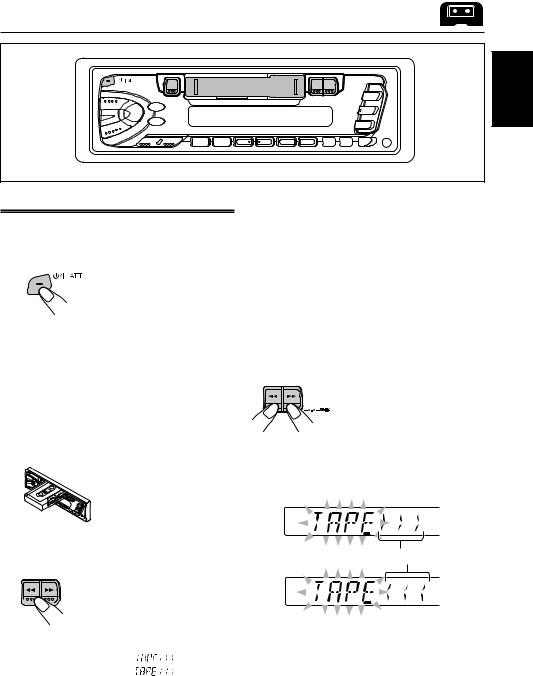
TAPE OPERATIONS
ENGLISH
Listening to a cassette
You can playback type 1 (normal) tapes.
1 Turn on the power.
Note on One-Touch Operation:
If a cassette is already in the cassette compartment, tape play starts automatically. However, it is not recommended to leave the cassette in the compartment when turning off the power or ignition key. It may damage the tape head and the cassette.
2 Insert a cassette into the cassette compartment.
When one side of the tape
reaches its end during play,
the other side of the tape
automatically starts playing.
(Auto Reverse)
To stop play and eject the cassette
Press 0.
Tape play stops and the cassette automatically ejects from the cassette compartment. The source changes to the previously selected one.
•You cannot change the source if the cassette is still in the cassette compartment.
To change source, you must eject the cassette first.
•You can also eject the cassette by pressing 0 while the unit is turned off.
To fast-wind a tape
Press in ¡ or 1.
The tape will be wound in the direction of the arrows (¡or 1).
3 Select the tape direction.
Press both buttons at the







 same time.
same time.
Each time you press both buttons, the tape direction changes alternately —
forward ( |
) and |
reverse ( |
). |
Tape direction
To restart playback, lightly press the other button which is not pressed in (1or ¡).
15
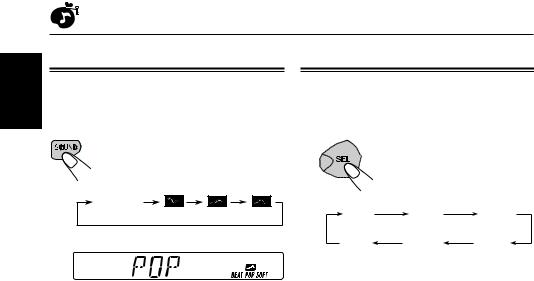
SOUND ADJUSTMENTS
ENGLISH
Selecting preset sound modes
You can select a preset sound adjustment suitable to the music genre.
Select the sound mode you want.
Each time you press the button, the sound mode changes as follows:
Adjusting the sound
You can adjust the sound characteristics to your preference.
1 Select the item you want to adjust.
Each time you press the button,
the adjustable items change as follows:
SCM OFF |
BAS |
TRE |
FAD |
(BEAT) (POP) (SOFT) |
|||
|
(bass) |
(treble) |
(fader) |
|
VOL |
LOUD |
BAL |
|
(volume) |
(loudness) |
(balance) |
For example, when “POP” is selected.
Indication |
For: |
Preset values |
|||
|
|
|
BAS |
TRE |
LOUD |
|
|
|
|
|
|
SCM OFF |
(Flat sound) |
00 |
00 |
ON |
|
|
|
|
|
|
|
BEAT |
Rock or disco |
+2 |
00 |
ON |
|
|
music |
|
|
|
|
|
|
|
|
|
|
POP |
Light music |
+4 |
+1 |
OFF |
|
|
|
|
|
|
|
SOFT |
Quiet |
+1 |
–3 |
OFF |
|
|
background |
|
|
|
|
|
music |
|
|
|
|
Notes:
•You can adjust each sound mode to your preference, and store it in memory.
If you want to adjust and store your original sound mode, see “Storing your own sound adjustments” on page 17.
•To adjust the bass and treble reinforcement levels or to turn on/off the loudness function temporarily, see the right column. (Your adjustments will be canceled if another source is selected.)
Indication |
To do: |
|
Range |
|
|
|
|
BAS |
Adjust the bass. |
–6 (min.) |
|
|
|
| |
|
|
|
+6 (max.) |
|
|
|
|
|
TRE |
Adjust the treble. |
–6 (min.) |
|
|
|
| |
|
|
|
+6 (max.) |
|
FAD* |
Adjust the front |
R6 (Rear only) |
|
|
and rear speaker |
| |
|
|
balance. |
F6 (Front only) |
|
|
|
|
|
BAL |
Adjust the left |
L6 |
(Left only) |
|
and right speaker |
| |
|
|
balance. |
R6 (Right only) |
|
|
|
|
|
LOUD |
Boost low and high |
LOUD ON |
|
|
frequencies to |
||
|
|
|
|
|
produce a well- |
| |
|
|
balanced sound |
LOUD OFF |
|
|
at low volume |
||
|
|
|
|
|
level. (When the |
|
|
|
loudness is on, the |
|
|
|
LOUD indicator |
|
|
|
lights up.) |
|
|
|
|
|
|
VOL |
Adjust the volume. |
00 |
(min.) |
|
|
| |
|
|
|
50 |
(max.) |
|
|
|
|
*If you are using a two-speaker system, set the fader level to “00.”
16
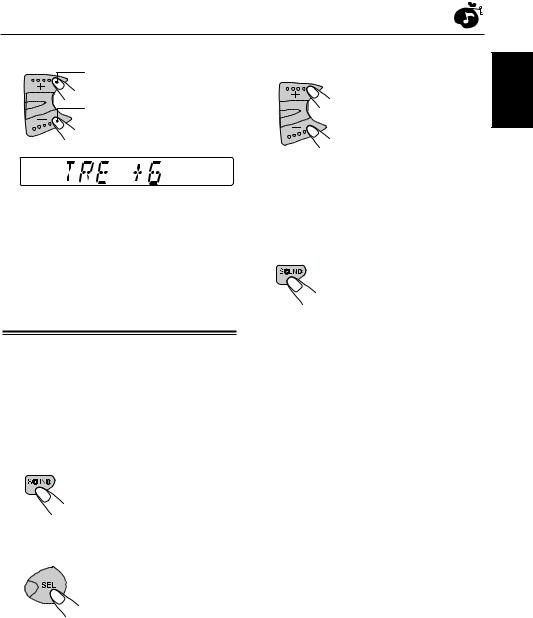
2 Adjust the level.
To increase the level.
To decrease the level.
Note:
Normally, the + and – buttons works as the volume control. So you do not have to select “VOL” to adjust the volume level.
Storing your own sound adjustments
You can adjust the sound modes (BEAT, POP, SOFT) to your preference and store your own adjustments in memory.
•There is a time limit in doing the following procedure. If the setting is canceled before you finish, start from step 1 again.
1 Call up the sound mode you want to adjust.
• See the left column for details.
2 Select “BAS” (bass), “TRE” (treble)
or “LOUD” (loudness).
3 Adjust the bass or treble level or turn the loudness function ON/OFF.
• See page 16 for details.
4 Repeat steps 2 and 3 to adjust the other items.
5 Press and hold SOUND until the sound mode you have selected in step 1 flashes on the display.
Your adjustment made for the selected sound mode is stored in memory.
6 Repeat the same procedure to store other sound modes.
To reset to the factory settings
Repeat the same procedure and reassign the preset values listed in the table on page 16.
ENGLISH
17
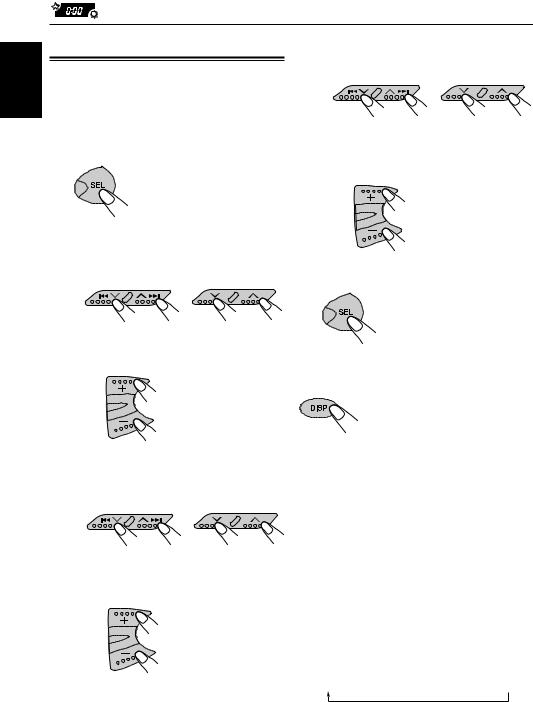
ENGLISH
OTHER MAIN FUNCTIONS
Setting the clock |
4 Set the clock system. |
You can also set the clock system to either 24 hours or 12 hours.
1 Press and hold SEL (select) for more than 2 seconds so that one of the PSM items appears on the display.
(See page 20.)
1 Select “24H/12H.”
KS-FX473R KS-F363R
KS-FX470R KS-F360R
2 Select “24H” or “12H.”
2 Set the hour.
1Select “CLOCK H” if not shown on the display.
KS-FX473R KS-F363R KS-FX470R KS-F360R
2 Adjust the hour.
3 Set the minute.
1 Select “CLOCK M.”
KS-FX473R KS-F363R KS-FX470R KS-F360R
2 Adjust the minute.
5 Press SEL (select) to finish the setting.
To check the current clock time or change the display mode
Press DISP (display) repeatedly.
Each time you press the button, the display mode changes as follows:
• During tuner operation:
Frequency 
 Clock
Clock
Notes:
* For the indication change during RDS operation, see page 13.
• During tape operation:
Play mode (tape direction) 
 Clock
Clock
•During CD changer operation: (For KS-FX473R/KS-FX470R only.)
Disc number Clock
Clock Elapsed playing time
Elapsed playing time
18

Changing the general settings (PSM)
You can change the items listed on the next page by using the PSM (Preferred Setting Mode) control.
Basic Procedure
1 Press and hold SEL (select) for more than 2 seconds so that one of the PSM items appears on the display.
(See page 20.)
2 Select the item you want to adjust. (See page 20.)
To select the telephone muting – TEL
This mode is used when a cellular phone system is connected. Depending on the phone system used, select either “MUTING 1” or “MUTING 2,” whichever mutes the sounds from this unit.
When shipped from the factory, this mode is deactivated.
• MUTING 1: Select this if this setting can mute the sounds.
• MUTING 2: Select this if this setting can mute
|
the sounds. |
• OFF: |
Cancels the telephone muting. |
1 Press and hold SEL (select) for more than 2 seconds so that one of the PSM items appears on the display.
KS-FX473R KS-F363R
KS-FX470R KS-F360R
3 Select or adjust the item selected above.
4 Repeat steps 2 and 3 to adjust the other PSM items if necessary.
5 Press SEL (select) to finish the setting.
2 Select “TEL.”
KS-FX473R KS-F363R
KS-FX470R KS-F360R
3 Select the desired setting — “MUTING 1,” “MUTING 2.”
4 Press SEL (select) to finish the setting.
ENGLISH
19
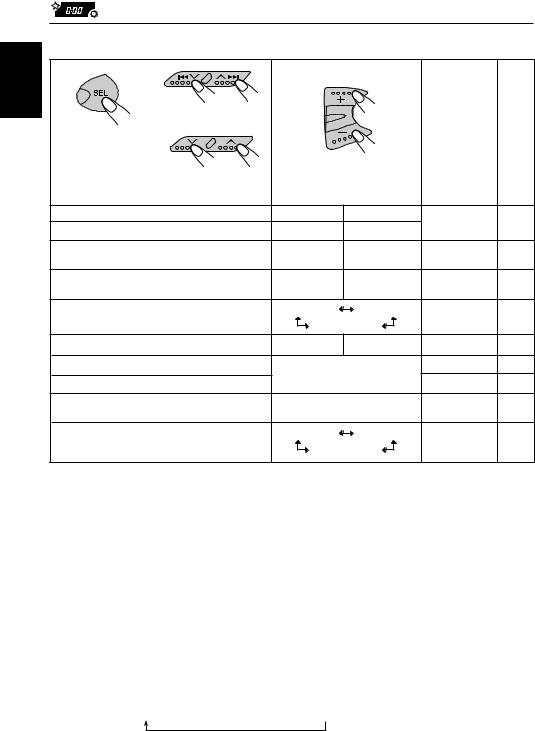
ENGLISH |
Preferred Setting Mode (PSM) items |
|
|
|
|
|
1 |
2 |
3 |
|
|
|
|
|
|
|
|
|||
|
|
KS-FX473R/KS-FX470R |
Set. |
|
Factory- |
See |
|
|
|
|
|||
|
|
|
|
preset |
||
|
|
|
|
|
page |
|
|
|
|
|
|
settings |
|
|
|
|
|
|
|
|
|
|
KS-F363R/KS-F360R |
|
|
|
|
|
Hold. |
Select. |
– |
+ |
|
|
|
CLOCK H |
Hour adjustment |
Back |
Advance |
0:00 |
18 |
|
CLOCK M |
Minute adjustment |
Back |
Advance |
||
|
|
|
||||
|
24H/ 12H |
24/12-hour time |
12H |
24H |
24H |
18 |
|
|
display |
||||
|
|
|
|
|
|
|
|
AUTO ADJ |
Automatic clock |
ADJ OFF |
ADJ ON |
ADJ ON |
13 |
|
|
setting |
||||
|
|
|
|
|
|
|
|
DISPMODE |
Display mode |
PS NAME |
FREQ |
PS NAME |
13 |
|
|
CLOCK |
||||
|
|
|
|
|
|
|
|
CH DISP* |
Changer display |
TIME |
DISC |
DISC |
20 |
|
PTY STBY |
PTY standby |
29 programme types |
NEWS |
10 |
|
|
PTY SRCH |
PTY search |
(see page 14.) |
(See page 10.) |
10 |
|
|
TA VOL |
Traffic announcement |
VOL 00 – VOL 50 |
VOL 20 |
13 |
|
|
|
volume |
||||
|
|
|
|
|
|
|
|
TEL |
Telephone muting |
OFF |
MUTING 1 |
OFF |
19 |
|
|
|
MUTING 2 |
|||
|
|
|
|
|
||
|
*Only for KS-FX473R/KS-FX470R |
|
|
|
|
|
Selecting the initial CD information display
You can select what type of the CD playback information to be initially shown on the display when you start playing a CD. When shipped from the factory, the disc number and track number information selected is shown.
• |
DISC: |
Disc number appear on the display. |
• |
TIME: |
Elapsed playing time appears on the display. |
1.Press and hold SEL (select) for more than 2 seconds so that one of the PSM items appears on the display.
2. Press 4  or
or  ¢to select “CH DISP (changer display).”
¢to select “CH DISP (changer display).”
3.Press + or – to set to the desired indication (“TIME” or “DISC”).
4.Press SEL (select) to finish the setting.
To see other information while playing a CD, press DISP.
Each time you press the button, the information changes alternately.
Disc number Clock
Clock Elapsed playing time
Elapsed playing time
20
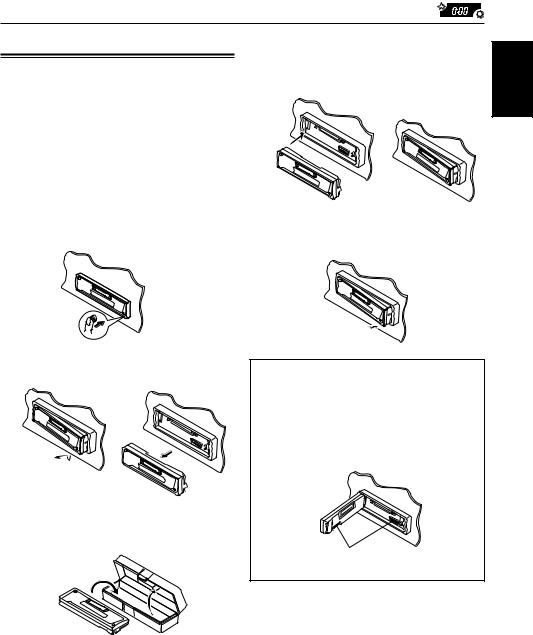
Detaching the control panel
You can detach the contol panel when leaving the car.
When detaching or attaching the control panel, be careful not to damage the connectors on the back of the control panel and on the panel holder.
Detaching the control panel
Before detaching the control panel, be sure to turn off the power.
1 Unlock the control panel.
2 Lift and pull the control panel out of the unit.
3 Put the detached control panel into the provided case.
Attaching the control panel
1 Insert the left side of the control panel into the groove on the panel holder.
2 Press the right side of the control panel to fix it to the panel holder.
Note on cleaning the connectors:
If you frequently detach the control panel, the connectors will deteriorate.
To minimize this possibility, periodically wipe the connectors with a cotton swab or cloth moistened with alcohol, being careful not to damage the connectors.
Connectors
ENGLISH
21
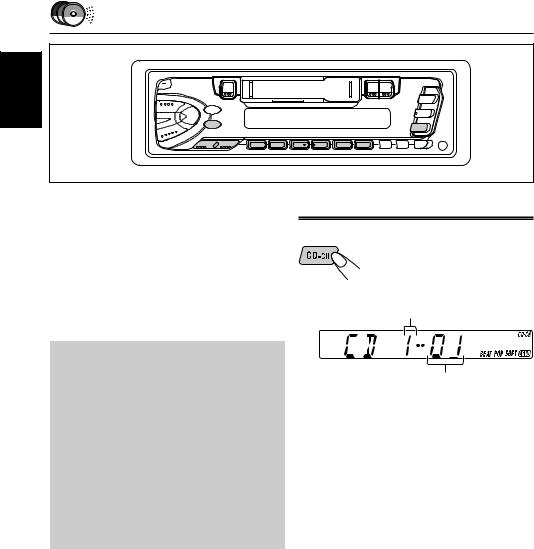
CD CHANGER OPERATIONS
ENGLISH
This section is only for KS-FX473R/KS-FX470R.
We recommend that you use one of the CH-X series with your unit.
If you have another CD automatic changer, consult your JVC IN-CAR ENTERTAINMENT dealer for connections.
• For example, if your CD automatic changer is one of the KD-MK series, you need a cord (KS-U15K) for connecting it to this unit.
Before operating your CD automatic changer:
•Refer also to the Instructions supplied with your CD changer.
•If no discs are in the magazine of the CD changer or the discs are inserted upside down, “NO CD” or “NO DISC” will appear on the display. If this happens, remove the magazine and set the discs correctly.
•If “RESET 1” – “RESET 8” appears on the display, something is wrong with the connection between this unit and the CD changer. If this happens, check the connection and make sure the cords are connected firmly. Then, press the reset button of the CD changer.
Playing CDs
Select the CD automatic changer (CD-CH).
Playback starts from the first track
of the first disc.
All tracks of all discs are played back.
Disc number
Track number
Note on One-Touch Operation:
When you press CD-CH, the power automatically turns on. You do not have to press 


 to turn on the power.
to turn on the power.
22
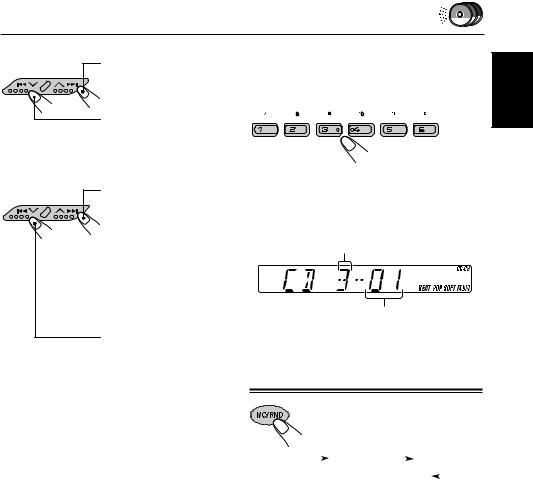
To fast-forward or reverse the track
Press and hold  ¢, while playing a CD, to fastforward the track.
¢, while playing a CD, to fastforward the track.
Press and hold 4  , while playing a CD, to reverse the track.
, while playing a CD, to reverse the track.
To go to the next track or the previous tracks
Press  ¢briefly, while playing a CD, to go ahead to the beginning of the next track. Each time you press the button consecutively, the beginning of the next track is located and played back.
¢briefly, while playing a CD, to go ahead to the beginning of the next track. Each time you press the button consecutively, the beginning of the next track is located and played back.
Press 4  briefly, while playing a CD, to go back to the beginning of the current track. Each time you press the button consecutively, the beginning of the previous tracks is located and played back.
briefly, while playing a CD, to go back to the beginning of the current track. Each time you press the button consecutively, the beginning of the previous tracks is located and played back.
To go to a particular disc directly
Press the number button corresponding to the disc number to start its playback (while the CD changer is playing).
•To select a disc number from 1 – 6: Press 1 (7) – 6 (12) briefly.
•To select a disc number from 7 – 12:
Press and hold 1 (7) – 6 (12) for more than 1 second.
Disc number
Track number
Ex. When disc number 3 is selected
Playing at random (Random Play)
Each time you press the button, CD random play mode changes as follows:
|
|
|
RND1 |
|
|
RND2 |
|
|||
|
|
|
|
|
|
|||||
|
|
|
|
|
|
Canceled |
|
|
||
|
|
|
|
|
|
|
|
|||
|
|
|
|
|
|
|
|
|
|
|
Mode |
RND |
Plays at random |
||||||||
|
Indicator |
|
|
|
|
|
|
|||
|
|
|
||||||||
RND1 |
Lights |
All tracks of the current |
||||||||
(random1) |
|
|
|
|
disc, then the tracks of |
|||||
|
|
|
|
|
the next disc, and so on. |
|||||
|
|
|
||||||||
RND2 |
Flashes |
All tracks of all discs |
||||||||
(random2) |
|
|
|
|
inserted in the magazine. |
|||||
|
|
|
|
|
|
|
|
|
|
|
ENGLISH
23
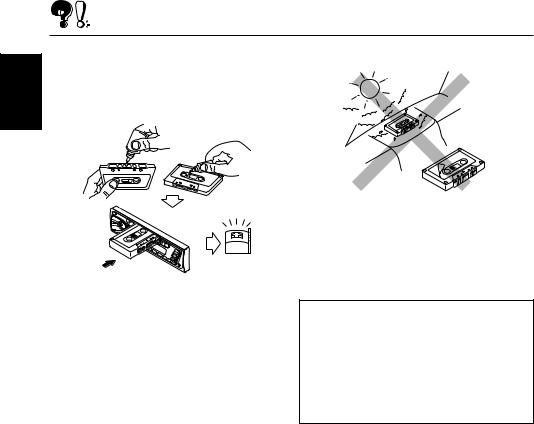
MAINTENANCE
ENGLISH
24
This unit requires very little attention, but you will be able to extend the life of the unit if you follow the instructions below.
To clean the head
•Clean the head after every 10 hours of use using a wet-type head cleaning tape (available at an audio store).
When the head becomes dirty, you may realize the following symptoms:
–Sound quality is reduced.
–Sound level decreases.
–Sound drops out.
•Do not play dirty or dusty tapes.
•Do not touch the highly-polished head with any metallic or magnetic tools.
To keep the tape clean
•Always store the cassettes to their storage cases after use.
•Do not store cassettes in the following places:
–Subject to direct sunlight
–With high humidity
–At extremely hot temperatures
CAUTION:
•Do not play the cassettes with peeling labels; otherwise, they can damage the unit.
•Tighten tapes to remove slack since loose tape may become entangled with the mechanism.
•Do not leave a cassette in the cassette compartment after use, as the tape may become slack.

TROUBLESHOOTING
What appears to be trouble is not always serious. Check the following points before calling a service center.
|
Symptoms |
Causes |
|
Remedies |
|
|
|
|
|
|
|
• |
A cassette tape cannot be |
You have tried to insert a |
Insert the cassette with the |
||
|
inserted. |
cassette in the wrong way. |
exposed tape facing right. |
||
|
|
|
|
|
|
• |
Cassette tapes become hot. |
This is not a malfunction. |
|
|
|
|
|
|
|||
|
|
|
|
|
|
• |
Tape sound is at very low |
The tape head is dirty. |
Clean it with a head cleaning |
||
|
level and sound quality is |
|
tape. |
||
|
degraded. |
|
|
|
|
|
|
|
|
|
|
• Sound is sometimes |
Connections are not good. |
Check the cords and |
|||
|
interrupted. |
|
connections. |
||
|
|
|
|
|
|
• |
Sound cannot be heard from |
The volume is turned to the |
Adjust it to the optimum level. |
||
|
the speakers. |
minimum level. |
|
|
|
|
|
|
|
||
|
|
Connections are incorrect. |
Check the cords and |
||
|
|
|
connections. |
||
|
|
|
|
|
|
• |
SSM (Strong-station |
Signals are too weak. |
Store stations manually. |
||
|
Sequential Memory) |
|
|
|
|
|
automatic preset does not |
|
|
|
|
|
work. |
|
|
|
|
|
|
|
|
|
|
• |
Static noise while listening to |
The antenna is not connected |
Connect the antenna firmly. |
||
|
the radio. |
firmly. |
|
|
|
|
|
|
|
|
|
ENGLISH
25

ENGLISH
For KS-FX473R/KS-FX470R only:
Symptoms |
|
Causes |
Remedies |
||
|
|
|
|
|
|
• “NO CD” or “NO DISC” |
No CD is in the magazine. |
Insert CDs into the magazine. |
|||
appears on the display. |
|
|
|
|
|
CDs are inserted incorrectly. |
Insert them correctly. |
||||
|
|||||
|
|
|
|
|
|
• “NO MAG” appears on the |
No magazine is loaded in the |
Insert the magazine. |
|||
display. |
CD changer. |
|
|||
|
|
|
|
|
|
• “RESET 8” appears on the |
This unit is not connected to a |
Connect this unit and the CD |
|||
display. |
CD changer correctly. |
changer correctly and press the |
|||
|
|
|
|
reset button of the CD changer. |
|
|
|
|
|
|
|
• “RESET 1” – “RESET 7” |
|
|
|
Press the reset button of the CD |
|
appears on the display. |
|
|
|
changer. |
|
|
|
|
|
|
|
26

SPECIFICATIONS
AUDIO AMPLIFIER SECTION
Maximum Power Output:
Front: |
40 W per channel |
Rear: |
40 W per channel |
Continuous Power Output (RMS): |
|
Front: |
16 W per channel into 4 Ω, 40 Hz |
|
to 20 000 Hz at no more than |
|
0.8% total harmonic distortion. |
Rear: |
16 W per channel into 4 Ω, 40 Hz |
to 20 000 Hz at no more than 0.8% total harmonic distortion.
Load Impedance: 4 Ω (4 Ω to 8 Ω allowance)
Tone Control Range:
Bass: ±10 dB at 100 Hz
Treble: ±10 dB at 10 kHz
Frequency Response: 40 Hz to 20 000 Hz
Signal-to-Noise Ratio: 70 dB
Line-Out Level/Impedance: KS-FX473R/KS-FX470R:
KS-F363R/KS-F360R:
TUNER SECTION
Frequency Range:
FM: |
87.5 MHz to 108.0 MHz |
AM: |
(MW) 522 kHz to 1 620 kHz |
|
(LW) 144 kHz to 279 kHz |
[FM Tuner]
Usable Sensitivity: 11.3 dBf (1.0 μV/75 Ω) 50 dB Quieting Sensitivity:
16.3 dBf (1.8 μV/75 Ω)
Alternate Channel Selectivity (400 kHz): 65 dB
Frequency Response: 40 Hz to 15 000 Hz
Stereo Separation: 30 dB Capture Ratio: 1.5 dB
CASSETTE DECK SECTION
Wow & Flutter: 0.15% (WRMS)
Fast-Wind Time: 190 sec. (C-60)
Frequency Response: 50 Hz to 14 000 Hz (Normal tape)
Signal-to-Noise Ratio: 52 dB
Stereo Separation: 40 dB
GENERAL
Power Requirement:
Operating Voltage: DC 14.4 V
(11 V to16 V allowance) Grounding System: Negative ground
Allowable Operating Temperature: 0°C to +40°C Dimensions (W × H × D):
Installation Size: 182 mm × 52 mm × 150 mm Panel Size: 188 mm × 58 mm × 14 mm
Mass: 1.3 kg (excluding accessories)
Design and specifications subject to change without notice.
[MW Tuner]
Sensitivity: 20 μV
Selectivity: 35 dB
[LW Tuner]
Sensitivity: 50 μV
ENGLISH
27

DEUTSCH
Wir danken Ihnen für den Kauf eines JVC Produkts. Bitte lesen Sie die Anleitung vollständig durch, bevor Sie das Gerät in Betrieb nehmen, um sicherzustellen, daß Sie alles vollständig verstehen und die bestmögliche Leistung des Geräts erhalten.
INHALT
ANORDNUNG DER TASTEN .............. |
3 |
KLANGEINSTELLUNG..................... |
16 |
|
Schalttafel — KS-FX473R/KS-FX470R ... |
3 |
Auswählen der voreingestellten |
|
|
Schalttafel — KS-F363R/KS-F360R ........ |
4 |
Klangmodus .......................................... |
16 |
|
GRUNDBEDIENUNGEN |
5 |
Klang-Einstellschritte ................................ |
16 |
|
Speichern Ihrer eigenen |
|
|||
Einschalten der Stromversorgung ............ |
5 |
Klangeinstellungen ................................. |
17 |
|
RADIOGRUNDBETRIEB ................... |
6 |
ANDERE WICHTIGE FUNKTIONEN ...... |
18 |
|
Radiohören .............................................. |
6 |
Stellen der Uhr ......................................... |
18 |
|
Speichern der Sender ............................... |
7 |
Ändern der allgemeinen Einstellungen |
|
|
Anwahl eines vorabgestimmten |
|
(PSM) .................................................... |
19 |
|
Senders ................................................. |
8 |
Abnehmen der Schalttafel ........................ |
21 |
|
RDS-BETRIEB ............................. |
9 |
CD-WECHSLERBETRIEB |
|
|
Betriebsmöglichkeiten mit der Funktion |
9 |
(ausschliesslich Modell KS-FX473R/ |
|
|
RDS ....................................................... |
KS-FX470R) |
22 |
||
Weitere praktische RDS-Funktionen |
|
|||
|
Abspielen der CDs |
22 |
||
und -Einstellungsmöglichkeiten |
13 |
|||
Wiedergeben der CD-Titel in zufälliger |
|
|||
|
|
|
||
KASSETTENBETRIEB ..................... |
15 |
Reihenfolge (Wiedergabe in zufälliger ... |
|
|
Hören einer Kassette ................................ |
15 |
Reihenfolge) .......................................... |
23 |
|
|
|
WARTUNG ................................. |
24 |
|
|
|
FEHLERSUCHE ............................ |
25 |
|
|
|
TECHNISCHE DATEN ...................... |
27 |
Hinweis:
Zu diesem Gerät wird eine Identifikationskarte mitgeliefert, auf der die Gerätechassis-Nummer vermerkt ist. Heben Sie diese Karte getrennt vom Gerät auf. Im Falle eines Diebstahls kann sie die Geräteidentifizierung erleichtern.
VOR DEM GEBRAUCH
*Für die Sicherheit....
•Die Lautstärke nicht zu laut stellen, da dadurch Außengeräusche überdeckt und das Autofahren gefährlich wird.
•Das Auto vor dem Durchführen von komplizierten Bedienschritten anhalten.
*Temperatur im Auto....
Wenn Sie das Auto für lange Zeit in heißem oder kaltem Wetter parken, bitte warten, bis sich die
Temperatur im Auto sich normalisiert hat, bevor Sie das Gerät einschalten.
2
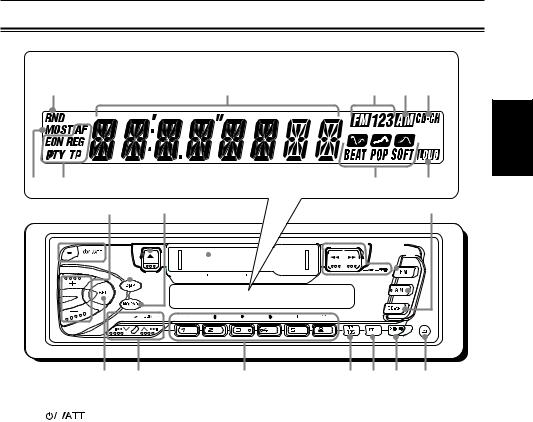
ANORDNUNG DER TASTEN 
Schalttafel — KS-FX473R/KS-FX470R
Displayfenster
i |
o |
; a s |
DEUTSCH
d f |
|
|
|
|
|
|
|
|
|
|
|
|
|
|
|
|
|
|
|
|
|
|
|
|
|
|
|
g |
|
|
|
|
|
h |
||
1 |
2 3 45 |
6 |
|
|
|
7 |
|
|
|
|
|
|
8 9 p |
|||||||||||||||||||||||
|
|
|
|
|
|
|
|
|
|
|
|
|
|
|
|
|
|
|
|
|
|
|
|
|
|
|
|
|
|
|
|
|
|
|
|
|
|
|
|
|
|
|
|
|
|
|
|
|
|
|
|
|
|
|
|
|
|
|
|
|
|
|
|
|
|
|
|
|
|
|
|
|
|
|
|
|
|
|
|
|
|
|
|
|
|
|
|
|
|
|
|
|
|
|
|
|
|
|
|
|
|
|
|
|
|
|
|
|
|
|
|
|
|
|
|
|
|
|
|
|
|
|
|
|
|
|
|
|
|
|
|
|
|
|
|
|
|
|
|
|
|
|
|
|
|
|
|
q |
w |
e |
r t y |
u |
|
|
|
|
|
1 |
Taste |
|
|
(Bereitschaft/Netz/Dämpfer) |
|
||||
2 |
Tasten +/– |
|
||
3 |
Taste DISP (Display) |
|||
4 |
Taste 0 (Auswerfen) |
|||
5 |
Taste MO/RND (Monophon/Zufall) |
|||
6 |
Kassettenfach |
|
||
7 |
Tasten 1/¡ (PROG:Program) |
|||
8 |
Taste FM |
|
||
9 |
Taste AM |
|
||
p Taste CD-CH (CD-Wechsler)
q Taste SEL (Auswahl)
wTasten 4 /
/ ¢
¢
• Dienen auch als Tasten SSM, wenn sie zusammen
gedrückt werden. e Zifferntasten
r Taste TP (Verkehrsinformationen) Taste RDS (Das Radiodatensystem)
t Taste PTY (Sendungstypen) y Taste SOUND
u Taste  (Freigabe der Bedienungsblende)
(Freigabe der Bedienungsblende)
Displayfenster
i Anzeige RND (Zufall)
o Hauptdisplay
;Zahlenanzeige des UKW-Frequenzbands FM1, FM2, FM3
a Anzeige AM
s Anzeige CD-CH (CD-Wechsler)
d Anzeige MO (Monophon)
Anzeige ST (Stereo)
fAnzeigen des RDS
AF, EON, REG, PTY, TP
gAnzeigen des Klangmodus BEAT, POP, SOFT
h Anzeige LOUD
3
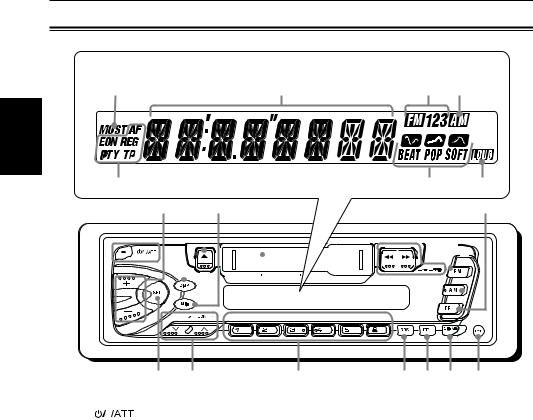
 ANORDNUNG DER TASTEN
ANORDNUNG DER TASTEN
Schalttafel — KS-F363R/KS-F360R
Displayfenster
i |
o |
; a |
DEUTSCH
s |
|
|
|
|
|
|
|
|
|
|
|
|
|
|
|
|
|
|
|
|
|
|
|
|
|
|
|
|
d |
|
|
|
|
|
f |
||
1 |
2 3 45 |
6 |
|
|
|
7 |
|
|
|
|
|
|
|
8 9 p |
|||||||||||||||||||||||
|
|
|
|
|
|
|
|
|
|
|
|
|
|
|
|
|
|
|
|
|
|
|
|
|
|
|
|
|
|
|
|
|
|
|
|
|
|
|
|
|
|
|
|
|
|
|
|
|
|
|
|
|
|
|
|
|
|
|
|
|
|
|
|
|
|
|
|
|
|
|
|
|
|
|
|
|
|
|
|
|
|
|
|
|
|
|
|
|
|
|
|
|
|
|
|
|
|
|
|
|
|
|
|
|
|
|
|
|
|
|
|
|
|
|
|
|
|
|
|
|
|
|
|
|
|
|
|
|
|
|
|
|
|
|
|
|
|
|
|
|
|
|
|
|
|
|
|
|
|
|
|
q |
w |
e |
r t y u |
1 |
Taste |
|
|
(Bereitschaft/Netz/Dämpfer) |
|
||||
|
||||
2 |
Tasten +/– |
|
||
3 |
Taste DISP (Display) |
|||
4 |
Taste 0 (Auswerfen) |
|||
5 |
Taste MO (Monophon) |
|||
6 |
Kassettenfach |
|
||
7 |
Tasten 1/¡ (PROG:Program) |
|||
8 |
Taste FM |
|
||
9 |
Taste AM |
|
||
p Taste TP (Verkehrsinformationen)
q Taste SEL (Auswahl)
wTasten  /
/
• Dienen auch als Tasten SSM, wenn sie zusammen
gedrückt werden. e Zifferntasten
r Taste RDS (Das Radiodatensystem) t Taste PTY (Sendungstypen)
y Taste SOUND
u Taste  (Freigabe der Bedienungsblende)
(Freigabe der Bedienungsblende)
Displayfenster
i Anzeige MO (Monophon)
Anzeige ST (Stereo) o Hauptdisplay
; Zahlenanzeige des UKW-Frequenzbands
FM1, FM2, FM3 a Anzeige AM
s Anzeigen des RDS
AF, EON, REG, PTY, TP
dAnzeigen des Klangmodus
BEAT, POP, SOFT
f Anzeige LOUD
4
